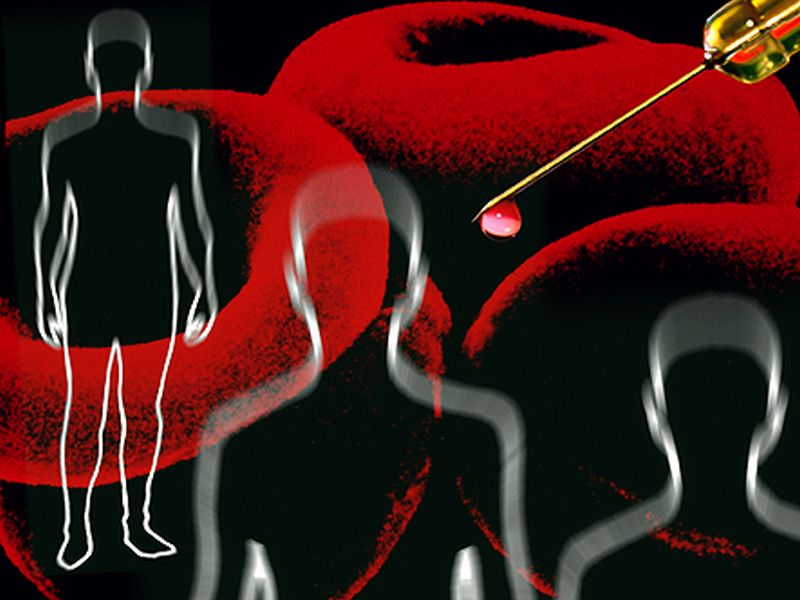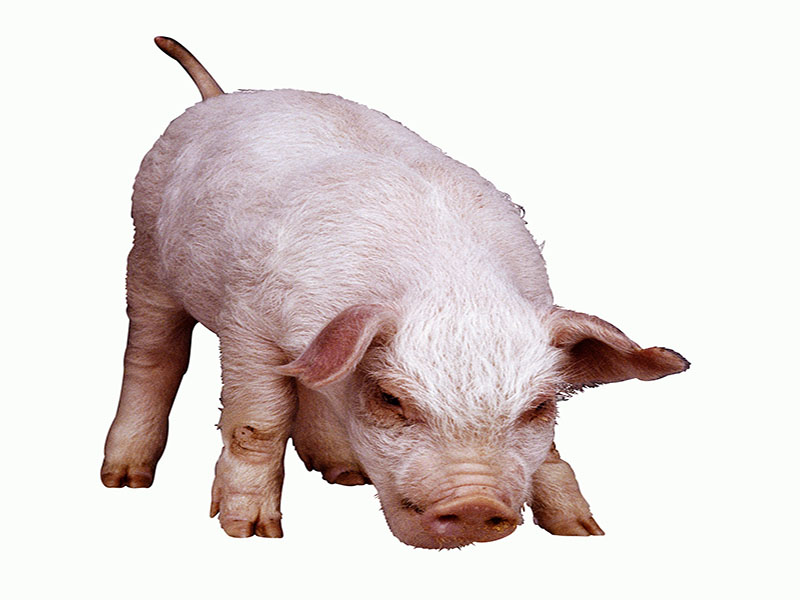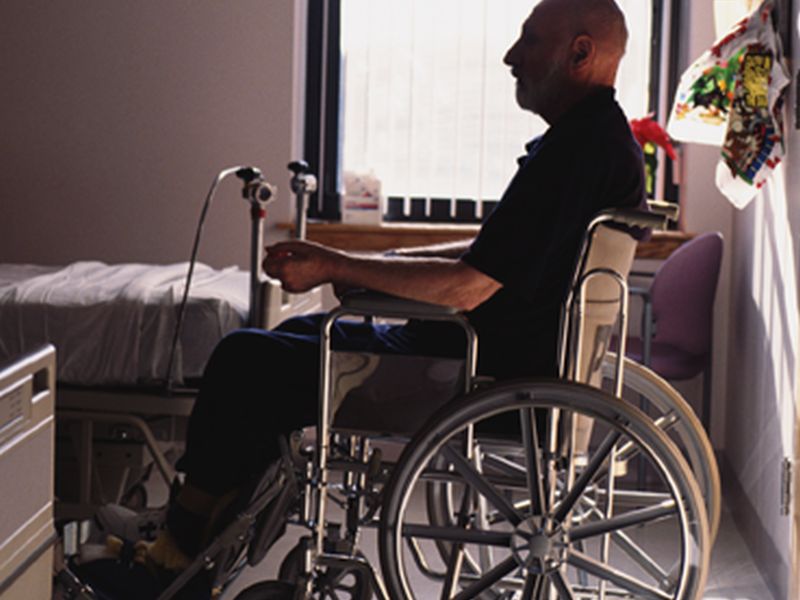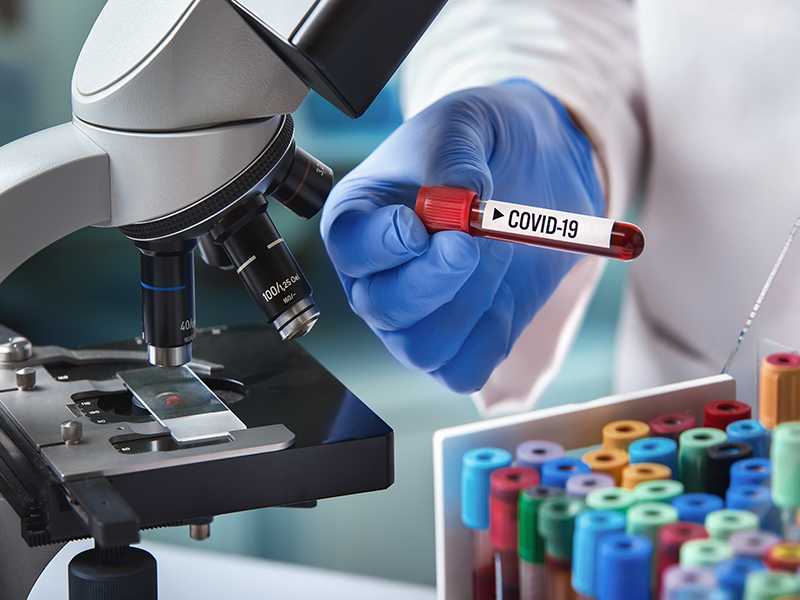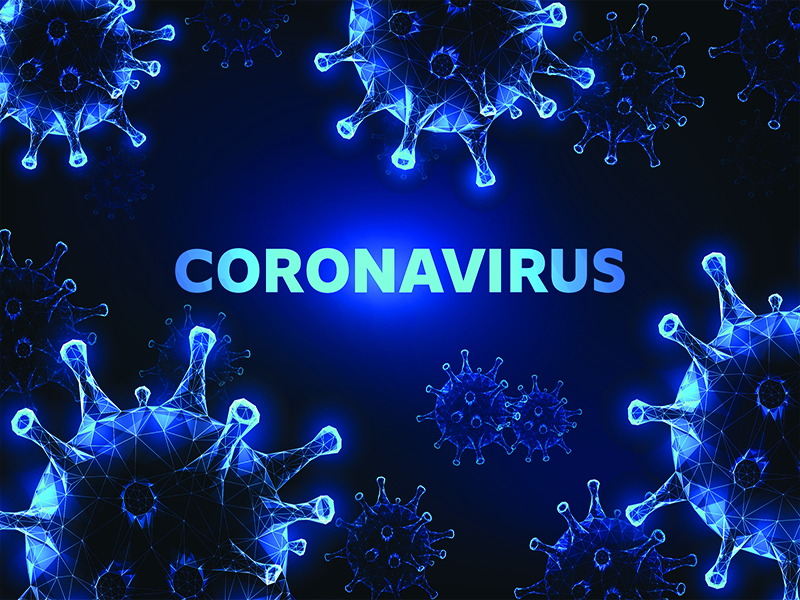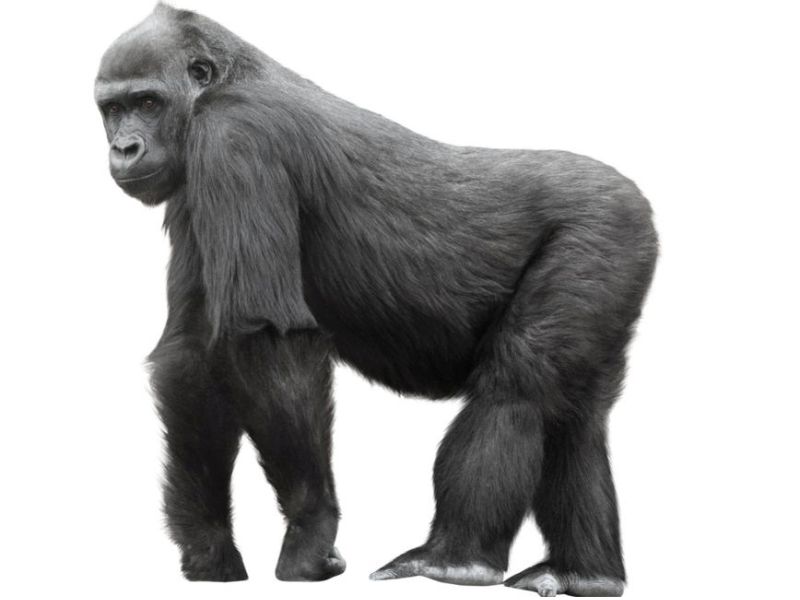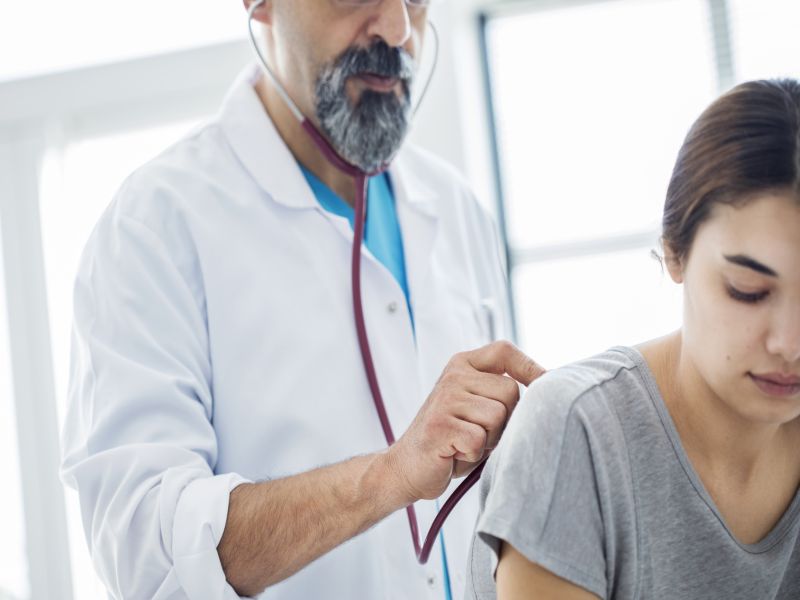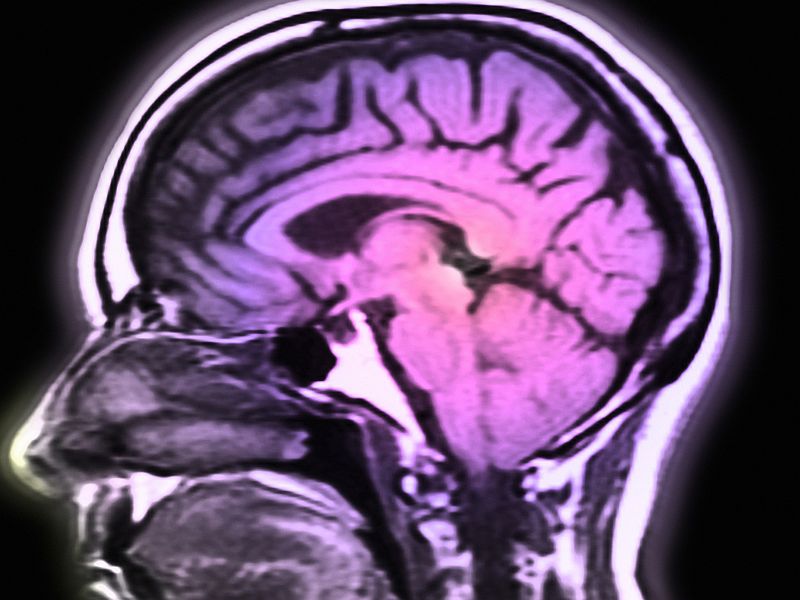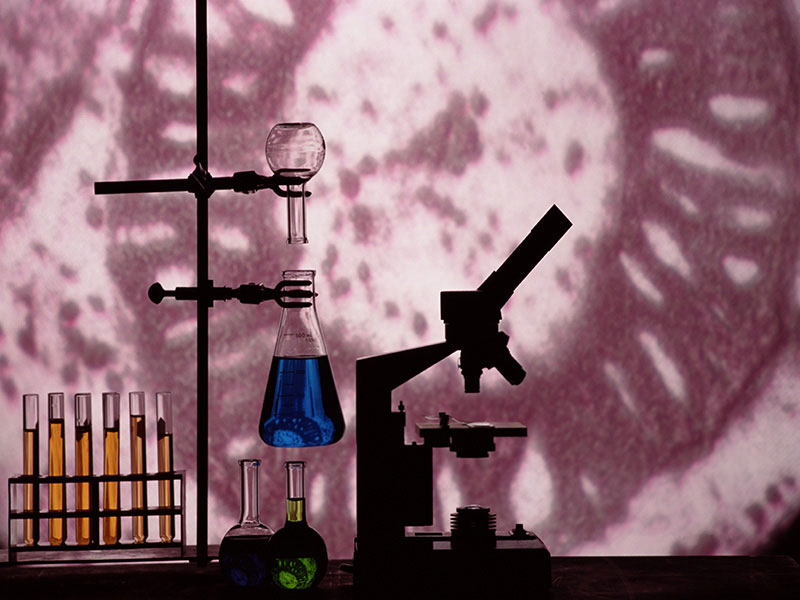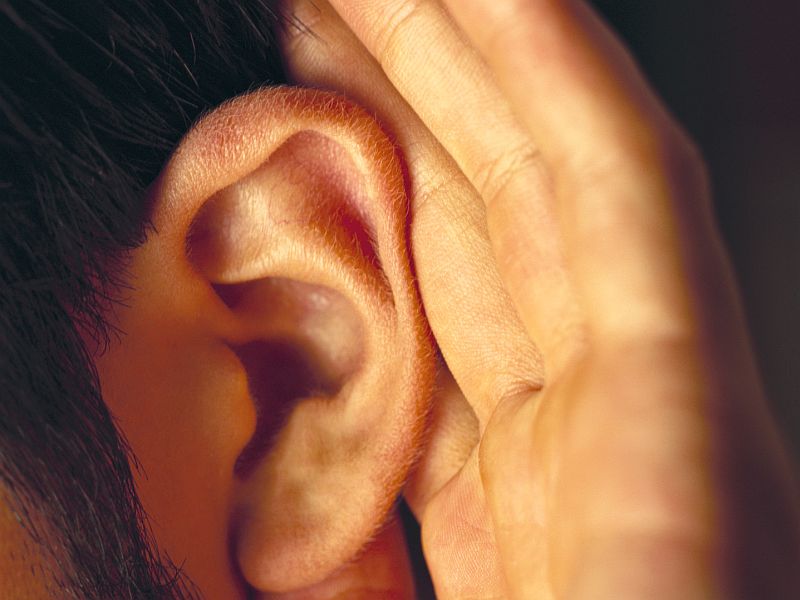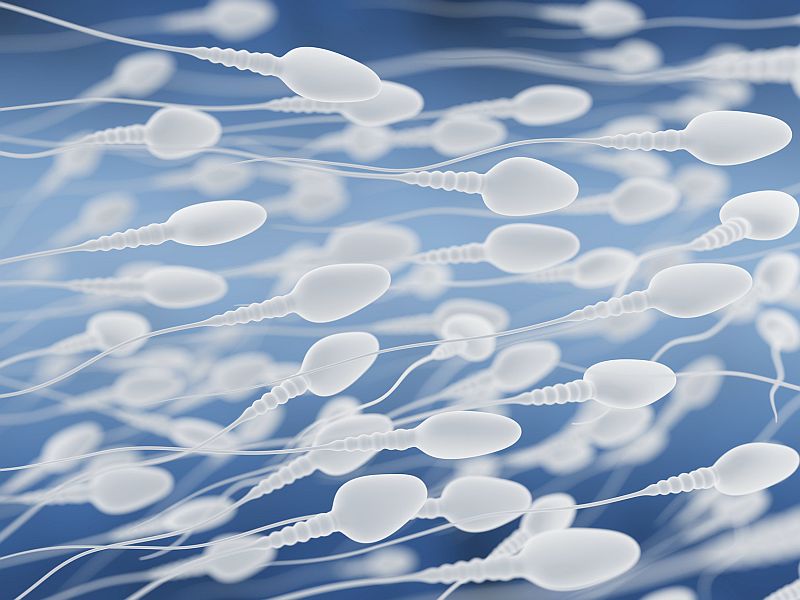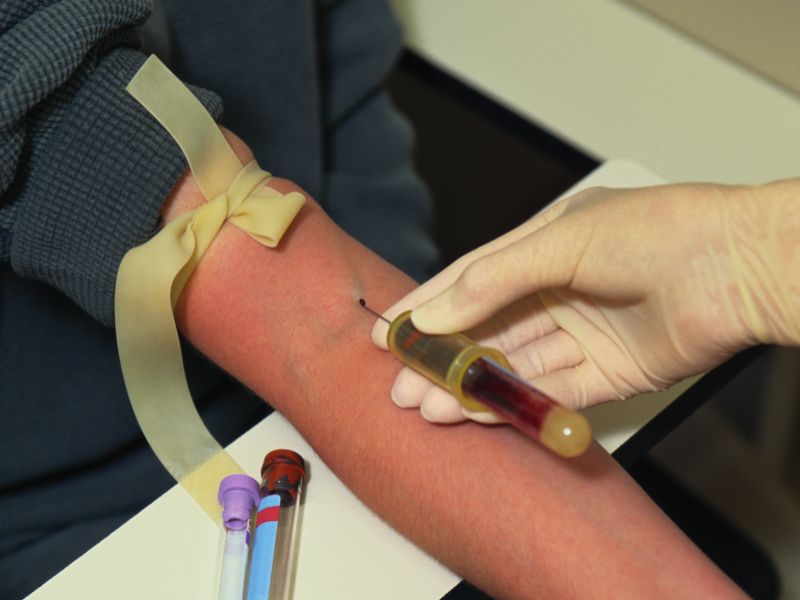Get Healthy!
471 Results for search "Research &, Development".
Health News Results - 471
Stroke survivor Ken Allsford focused intensely on how he wanted to bend his elbow.
And then the robot exoskeleton attached to his left arm obeyed his unspoken command, moving his crippled limb.
"It was a combination of exciting and trepidation, because sometimes nothing would happen," Allsford, 61, of Katy, Texas, recalled. "But when you actually see it move without actually making ...
- Dennis Thompson HealthDay Reporter
- |
- February 2, 2021
- |
- Full Page
Like influenza, could COVID-19 evolve to wax and wane with the seasons? New research suggests it might.
Early in the pandemic, some experts suggested that SARS-CoV-2 -- the virus that causes COVID-19 -- may behave like many other coronaviruses that circulate more widely in fall and winter.
To find out if that could be true, researchers analyzed COVID-19 data -- including cases, deat...
- Robert Preidt
- |
- February 2, 2021
- |
- Full Page
Previous exposure to other coronaviruses may enhance a person's immune response to COVID-19 infection, but new research suggests that antibodies triggered by the SARS outbreak of 2003 provide only limited protection against the new coronavirus.
Antibodies are blood proteins made by the immune system to protect against infection, the Oregon Health & Science University (OHSU) researchers ex...
- Robert Preidt
- |
- February 1, 2021
- |
- Full Page
The new coronavirus is mutating in an attempt to elude vaccines and treatments, putting a greater onus on Americans to get vaccinated and use social distancing measures to avoid infection, U.S. health officials said Friday.
New COVID-19 variants out of South Africa and Brazil -- B.1.351 and P1, respectively -- contain a mutation called E484K, "which results in changes in the shape of the ...
- Dennis Thompson HealthDay Reporter
- |
- January 29, 2021
- |
- Full Page
An experimental gene therapy for Duchenne muscular dystrophy shows promise, a small study suggests.
The severe form of muscular dystrophy -- which affects about one in 3,500 males born each year in the United States -- causes muscles to progressively weaken and lose the ability to regenerate after an injury.
Muscle tissue is eventually replaced by fat and collagen. Many children wit...
- Robert Preidt
- |
- January 28, 2021
- |
- Full Page
To the ever-growing list of COVID-19's collateral damage, add one more casualty: cancer research.
A new study indicates that during the first wave of the pandemic last spring, the number of newly launched cancer treatment studies cratered by 60%.
"In short, the first wave of COVID slowed scientific progress in a health-related area distant from the disease itself," said study author...
- Alan Mozes HealthDay Reporter
- |
- January 27, 2021
- |
- Full Page
Previous coronavirus infections might prime the immune system to fight the new coronavirus that causes COVID-19, a new study suggests.
There are numerous types of coronaviruses, including many harmless ones that cause mild upper respiratory infections similar to the common cold.
Besides SARS-CoV-2 -- the virus that causes COVID-19 -- other deadly coronaviruses include MERS-CoV, whic...
- Robert Preidt
- |
- January 22, 2021
- |
- Full Page
A promising step toward using retinal cell transplants to treat blindness is reported in a new study.
Adult retinal stem cells from deceased human donors survived when they were transplanted into the eyes of non-human primates, according to the researchers.
The cells were taken from the retinal pigment epithelium (RPE). It is a layer of cells that supports and nourishes the retina, ...
- Robert Preidt
- |
- January 19, 2021
- |
- Full Page
Noninvasive electrical stimulation of the brain, fine-tuned to specific "circuitry" gone awry, might help ease obsessive-compulsive behaviors, an early study hints.
Researchers found that the brain stimulation, delivered over five days, reduced obsessive-compulsive tendencies for three months, though in people who did not have full-blown obsessive-compulsive disorder (OCD).
It's too...
- Amy Norton HealthDay Reporter
- |
- January 19, 2021
- |
- Full Page
Biomarkers in sperm may help identify men at risk of fathering children with autism, researchers say.
For the study, investigators examined sperm epigenetics -- the molecular processes that affect gene expression -- in 13 men who fathered sons with autism and 13 who had children without the disorder.
The American and Spanish researchers focused specifically on DNA methylation, a che...
- Robert Preidt
- |
- January 14, 2021
- |
- Full Page
Scientists have created the first computer model of the entire virus that causes COVID-19 and will share it with other researchers trying to find ways to fight the pandemic.
"If you can understand how a virus works, that's the first step towards stopping it," Gregory Voth, a chemistry professor at the University of Chicago, said in a school news release. "Each thing you know about the vir...
- Robert Preidt
- |
- January 14, 2021
- |
- Full Page
New research offers a novel explanation for the long-term brain problems many COVID-19 patients experience.
Many coronavirus patients report headaches and "brain fog" for weeks or months after they recover from respiratory symptoms. It's been believed that these lingering neurological issues are the result of nerve cell damage, but the new study suggests that the virus may instead be stri...
- Robert Preidt
- |
- January 13, 2021
- |
- Full Page
Unlike regular pneumonia, COVID-19 pneumonia spreads like many "wildfires" throughout the lungs, researchers say.
This may explain why COVID-19 pneumonia lasts longer and causes more harm than typical pneumonia, according to the researchers at Northwestern Medicine in Chicago.
The research team said that their aim is to make COVID-19 more like a bad cold.
For the study, the te...
- Robert Preidt
- |
- January 12, 2021
- |
- Full Page
By Nov. 15 of last year, roughly 47 million Americans -- about 14.5% of the U.S. population -- had already been infected with the new coronavirus, a new study finds.
That's much higher than the close to 11 million knownU.S. cases of infection that were recorded by that date, the researchers said, because reported cases "do not represent the full SARS-CoV-2 disease burden."
- Ernie Mundell
- |
- January 5, 2021
- |
- Full Page
A new study supports the theory that people who suffer a spinal cord injury may also have accelerated brain aging that affects how fast they process information.
Those "cognitive deficits" are similar to those in older adults, according to research from the nonprofit Kessler Foundation in New Jersey.
Individuals with chronic spinal cord injury (SCI) have an increased risk for cognit...
- Cara Murez
- |
- January 5, 2021
- |
- Full Page
THURSDAY, Dec. 31, 2020 -- Folks who contract COVID-19 can expect to gain some durable immunity against future infection, according to a new study of memory cells within the immune systems of coronavirus patients.
Previous studies have raised concern that COVID-19 patients might lose their immunity quickly once they recover, because the first wave of coronavirus antibodies tends to wane a...
- Dennis Thompson
- |
- December 31, 2020
- |
- Full Page
THURSDAY, Dec. 31, 2020 -- A new and more infectious variant of the COVID-19 virus has shown up in separate cases in Colorado and California, weeks after it first emerged in the United Kingdom.
Doctors on the pandemic's front line say people shouldn't panic, but should definitely adhere even more closely to proven infection control measures, like mask wearing and social distancing.
...
- Dennis Thompson
- |
- December 31, 2020
- |
- Full Page
Blood vessel damage and inflammation in the brains of deceased COVID-19 patients suggest the damage is not caused by the virus, but the body's immune response to it.
Researchers from the U.S. National Institutes of Health (NIH) consistently found signs of damage caused by thinning and leaky brain blood vessels in tissue samples from patients who died shortly after getting COVID-19.
...
- Steven Reinberg
- |
- December 31, 2020
- |
- Full Page
Those mussels, oysters and scallops on your plate may come with a secret ingredient: microplastics.
Researchers at Hull York Medical School and the University of Hull in the United Kingdom reviewed more than 50 studies (from 2014 to 2020) to investigate the levels of microplastic contamination globally in fish and shellfish.
The investigators found that mollusks (such as clams, muss...
- Cara Murez
- |
- December 28, 2020
- |
- Full Page
For Americans who are worried about the new coronavirus variant that is circulating in Britain, experts in the United States urge everyone to stay calm.
So far, the new variant only seems to spread more easily, with no evidence of higher virulence (ability to cause harm), researchers at Northwestern Medicine in Chicago explained.
"There's no reason to get scared or panic, we j...
- Robin Foster
- |
- December 22, 2020
- |
- Full Page
As scientists have labored to understand COVID-19 and develop a vaccine to combat it, interest in infectious disease careers seems to be growing.
Academic leaders from the United States and Israel have noted the increased interest among medical students.
"We just went through an applications season for fellows, and we had more applicants than in recent years," said Richard D'Aquila,...
- Cara Murez
- |
- December 21, 2020
- |
- Full Page
As America rolls out a nationwide coronavirus vaccination campaign this week, experts help answer your questions about the new COVID-19 vaccines.
Both the Pfizer vaccine (already approved by the U.S. Food and Drug Administration) and the Moderna vaccine (up for approval) were developed using a technology called messenger RNA, or mRNA, explained Dr. Thomas Ma. He's chair of the department ...
- Cara Murez
- |
- December 16, 2020
- |
- Full Page
Humans, ferrets, cats, civets and dogs are the animals most susceptible to infection with the new coronavirus, researchers say.
The analysis of 10 species also found that ducks, rats, mice, pigs and chickens were less or not susceptible to SARS-CoV-2 infection.
"Knowing which animals are susceptible to SARS-CoV-2 helps us prevent building up animal reservoirs from which the coronavi...
- Robert Preidt
- |
- December 15, 2020
- |
- Full Page
Important clues about Crohn's disease in children have emerged in new research.
Scientists analyzed gene expression in individual cells in the inner lining (epithelium) of the intestines of human fetuses, six to 10 weeks after conception.
Then, they examined tissue from the intestines of 4- to 12-year-olds with Crohn's disease.
The upshot: Some of the cellular pathways active ...
- Robert Preidt
- |
- December 14, 2020
- |
- Full Page
Results from a long-term study of a gene therapy technique to prevent inherited mitochondrial disease show promise, researchers say.
Studies of the technique at Oregon Health & Science University in Portland show no adverse health effects in rhesus macaque monkeys and their offspring. The researchers said the technique could break the cycle of disease passed from mother to baby through mu...
- Cara Murez
- |
- December 11, 2020
- |
- Full Page
Scientists say they may be getting closer to creating a universal flu vaccine.
In an early-stage clinical trial with 65 volunteers in the United States, an experimental vaccine triggered strong immune responses to a wide range of flu virus strains and subtypes. The immune responses lasted at least 18 months, according to the researchers at Mount Sinai Health System, in New York City.
<...- Robert Preidt
- |
- December 7, 2020
- |
- Full Page
A pair of new gene therapies promise a potentially lasting cure for sickle cell disease by subtly altering the genetic information in patients' bone marrow cells, researchers report.
Both therapies work by switching on a gene that promotes production of fetal hemoglobin, said Dr. Lewis Hsu, chief medical officer of the Sickle Cell Disease Association of America.
Sickle cell dis...
- Ernie Mundell
- |
- December 5, 2020
- |
- Full Page
When actor, writer and producer Mindy Kaling's mom was fighting pancreatic cancer, it was the biggest struggle the family had ever experienced.
Swati Chokalingam, a Boston-area obstetrician/gynecologist and Kaling's mom, died in 2012 after getting a stage 4 diagnosis eight months earlier.
Now Kaling is raising awareness for the Pancreatic Cancer Action Network (PanCAN) as official b...
- Cara Murez
- |
- November 18, 2020
- |
- Full Page
People paralyzed with spinal cord injuries can safely and effectively use an exoskeleton to assist them in walking, a new study finds.
"Participants showed improvement regardless of level of injury, completeness or duration of injury," said Gail Forrest, director of the Tim and Caroline Reynolds Center for Spinal Stimulation at Kessler Foundation in East Hanover, N.J.
The findings ...
- Cara Murez
- |
- November 18, 2020
- |
- Full Page
Immunity to the new coronavirus may last six months or longer after people recover from infection, a new study suggests.
Researchers collected blood samples from 149 patients who had COVID-19 early in the pandemic and analyzed them for immune cells that make antibodies that block the SARS-CoV-2 virus from entering cells.
One month after infection, all of the patients had coronavirus...
- Robert Preidt
- |
- November 17, 2020
- |
- Full Page
A single pill loaded with cholesterol and blood pressure medications can reduce your risk of heart attack and stroke by as much as 40%, a new international study reports.
The "polypill" containing three generic blood pressure medications and a statin dramatically reduced the risk of heart-related illness in people with no prior history of heart problems, according to clinical trial result...
- Dennis Thompson
- |
- November 16, 2020
- |
- Full Page
Scientists say they have spotted the gene responsible for telling you when it's time to pee.
The gene, called PIEZO2, may help at least two different types of cells sense when the bladder is full and needs to be emptied.
"Urination is essential for our health. It's one of the primary ways our bodies dispose of waste. We show how specific genes and cells may play criti...
- Steven Reinberg
- |
- October 26, 2020
- |
- Full Page
A combination of two "targeted" therapies can beat back a rare form of blood cancer -- without the toxic effects of chemotherapy, a new study has found.
In a trial of 63 patients, researchers found that the drug regimen frequently wiped out all signs of the cancer -- a subtype of the blood cancer acute lymphoblastic leukemia (ALL). And at 18 months, 95% of patients were still aliv...
- Amy Norton
- |
- October 21, 2020
- |
- Full Page
A coronavirus strain that has plagued the swine industry in recent years may have the ability to spread to people, researchers say.
Swine acute diarrhea syndrome coronavirus (SADS-CoV) has infected swine herds throughout China since its discovery in 2016, according to a new report.
In lab tests, scientists at the University of North Carolina (UNC) at Chapel Hill showed that ...
- Robert Preidt
- |
- October 19, 2020
- |
- Full Page
An experimental drug combination lengthens survival for patients with amyotrophic lateral sclerosis (ALS), new research shows.
A previous clinical trial found that the two-drug combo -- called AMX0035 -- slowed progression of the neurodegenerative disease over six months.
The new clinical trial of 137 patients with the disease, also known as Lou Gehrig's disease, found that ...
- Robert Preidt
- |
- October 16, 2020
- |
- Full Page
After a serious case of COVID-19 you may have long-lasting immunity, a new study finds.
The finding is reassuring to patients because the immune system makes antibodies in response to SARS-CoV-2, the virus that causes COVID-19, the researchers said.
"But there is a big knowledge gap in terms of how long these antibody responses last," said researcher Dr. Richelle Charles o...
- Steven Reinberg
- |
- October 13, 2020
- |
- Full Page
The so-called love hormone, oxytocin, may be worth investigating as a treatment for COVID-19, a new study suggests.
One of the most serious complications of infection with the new coronavirus is a "cytokine storm," in which the body attacks its own tissues.
There are currently no U.S. Food and Drug Administration-approved treatments for COVID-19, which means that "repurposin...
- Robert Preidt
- |
- October 9, 2020
- |
- Full Page
They are the closest relatives to humans, but gorillas have been spared one aging disease that people haven't: osteoporosis.
The condition triggers accelerated bone loss and weakening.
In a new study, researchers used a CT scanner to analyze the leg, arm and spine bones of 34 wild mountain gorillas from Rwanda -- 16 females and 17 males -- aged 11 to 43. That's the full adul...
- Robert Preidt
- |
- October 2, 2020
- |
- Full Page
Researchers may have found a way for people with severe hemophilia to take their standard treatment less often, if the results of an early trial pan out.
In what experts called a feat of bioengineering, scientists were able to create a "fusion protein" that may extend the interval between treatments for hemophilia -- from about every couple of days to once a week.
The early ...
- Amy Norton
- |
- September 9, 2020
- |
- Full Page
Asthma treatments tailored to the genes of kids and teens could help improve control of their symptoms, new research suggests.
The study included 241 adolescents, aged 12 to 18, who were randomly selected to receive either traditional asthma treatment or "personalized medicine" -- treatment based on their individual genetics.
During a year of follow-up, those in the personal...
- Robert Preidt
- |
- September 8, 2020
- |
- Full Page
A new clinical trial will try to determine whether the measles, mumps and rubella (MMR) vaccine can protect health care workers from being infected with COVID-19.
Hundreds of millions of people have received the MMR vaccine since it was developed nearly 50 years ago. It's usually given to children before age 6. Growing evidence suggests that the vaccine may also prevent COVID-19.
...- Steven Reinberg
- |
- September 4, 2020
- |
- Full Page
An experimental treatment may help slow the progression of the deadly brain disease amyotrophic lateral sclerosis (ALS), a new study finds.
Researchers called the results a promising step in the fight against a devastating and invariably fatal disease. And two advocacy groups are calling for swift action to make the drug available to patients.
ALS is also known as Lou Gehrig...
- Amy Norton
- |
- September 2, 2020
- |
- Full Page
New research that shows flu viruses can spread through the air on dust, fibers and other microscopic particles has implications for the spread of the new coronavirus, scientists say.
"It's really shocking to most virologists and epidemiologists that airborne dust, rather than expiratory droplets, can carry influenza virus capable of infecting animals," said lead researcher William Ris...
- Robert Preidt
- |
- August 26, 2020
- |
- Full Page
While there are treatments to alleviate symptoms of Parkinson's disease, there is no known cure or preventive drug. But a recent review offers some encouraging findings.
The review found more than 100 clinical trials are underway around the world that are testing various preventive therapies and treatments for the neurodegenerative disorder.
The large number of trials, and ...
- Serena McNiff
- |
- August 20, 2020
- |
- Full Page
Fewer Americans have been dying of lung cancer in recent years -- partly because of advances in treatment, a new government study finds.
The researchers found that after a gradual decline, lung cancer deaths in the United States started to drop more quickly in 2013. That coincided with the introduction of new "targeted" drugs that can more precisely go after certain lung tumors.
...- Amy Norton
- |
- August 12, 2020
- |
- Full Page
There is a longstanding fear in the scientific community that pharmaceutical companies could sway the research published in medical journals by paying them for advertising, but a new study reveals that advertising might not be the problem.
"All the available literature suggests that ad revenue should be the real concern, but that's not what we found," said study author S. Scott Graham...
- Serena McNiff
- |
- August 11, 2020
- |
- Full Page
Like many other animals, people can move their ears to focus on a specific sound, researchers say.
However, this movement of ears is subtle and the ability to do it hasn't been known until now.
By measuring electrical signals in ear muscles as volunteers tried to detect sounds, researchers found that people make tiny, unconscious movements to aim their ears at a particular s...
- Robert Preidt
- |
- August 4, 2020
- |
- Full Page
If you ever had a sex-ed class in school, you have probably seen a visual of sperm swimming with a wagging tail. Now, high-tech tools have shattered that view of how sperm move.
More than 300 years ago, a Dutch scientist used an early microscope to observe human sperm in motion. He saw that they appeared to swim using a tail that moved from one side to the other.
But scient...
- Serena McNiff
- |
- July 31, 2020
- |
- Full Page
Although scientists haven't nailed down how the new coronavirus jumped to humans, a new study confirms mosquitoes aren't to blame -- and you won't get COVID-19 from a mosquito bite.
"While the World Health Organization has definitively stated that mosquitoes cannot transmit the virus, our study is the first to provide conclusive data supporting the theory," said study author Stephen H...
- Robert Preidt
- |
- July 29, 2020
- |
- Full Page
A new blood test offers hope that doctors may soon be able to diagnose Alzheimer's disease with astonishing accuracy.
A study led by Swedish researchers found the test did more than differentiate between Alzheimer's and other types of dementia. It also spotted signs of Alzheimer's two decades before symptoms appeared in people who were genetically predisposed to develop the degenerati...
- Robin Foster
- |
- July 28, 2020
- |
- Full Page




























